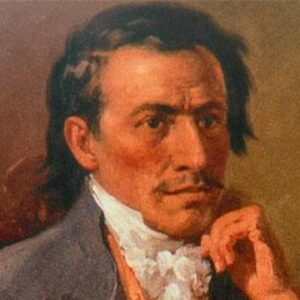Francisco Javier Eugenio de Santa Cruz y Espejo was a prominent colonial Ecuadorian figure. He was a physician, a writer, and a lawyer. He founded Quito’s first newspaper and hygienist. He even wrote an article about the microorganisms and sanitary conditions that contributed to the spread of diseases. His satirical writings were inspirational and reflected the Enlightenment ideas that had swept through Europe. Throughout his life, poverty and racism were prevalent in Ecuador, and he worked tirelessly to educate the public about how the Royal Audencia, the Quito presidency, failed to manage finances, the corruption that pervaded the political system, and the problems caused by a lack of education. His writings were critical of the Royal Audencia, and his satirical work and writings were despised by the rulers. During his youth, he was exiled by the Royal Audencia and was finally apprehended a few days before his death.
Childhood & Adolescence
Espejo was born in 1747 to Luis de la Cruz Chuzhig, a Cajamarca-born Quichua Indian, and Maria Catalina Aldás, a Quito-born mulatta. Juan Pablo and Mara Manuela Espejo were Espejo’s younger siblings.
Despite his family’s precarious economic situation, Espejo received an excellent education and gained medical knowledge while working alongside his father at the hospital de la Misericordia.
He was not subjected to racial discrimination because his family was considered white. He graduated from medical school on July 10, 1767, and later studied canon law and jurisprudence from 1780 to 1793 under Dr. Ramón Yépez.
On August 14, 1772, he applied for and was granted permission to practice medicine. After that, his whereabouts are unknown until 1778, when he wrote a polemical sermon.
Career of Eugenio Espejo
Espejo wrote a satirical manuscript in the style of Lucian in 1779. The manuscript, titled El nuevo Luciano de Quito, was written in dialogues to make it understandable to the average person. Espejo wrote this work anonymously and criticized the colonial authorities’ corruption and the Audencia people’s lack of education.
In 1781, he wrote La cienciablancardina, the sequel to his first satirical manuscript, in response to a Mercedarian priest from Quito’s criticism.
To get rid of him, the authorities appointed him head physician for Francisco de Requena’s scientific expedition to the Pará and Maraon rivers to establish the Audiencia’s boundaries. Espejo attempted to decline the appointment but was not permitted to do so. He then attempted to flee but was apprehended and returned as a serious offense criminal.
Espejo was commissioned by the town council to write about smallpox in 1785, and he produced a detailed work criticizing the Audencia’s hygiene conditions. He was critical of the physicians and priests in charge of public health in the Audencia in this work. This work earned him numerous enemies, and he was eventually forced to flee Quito.
He stopped in Riobamba on his way to Lima, where a group of priests requested that he write a response to a report written by Ignacio Barreto, the chief tax collector. Espejo took up the task and wrote Defensa de loscuras de Riobamba (Defense of the Riobamba clergy), a detailed study of the Riobamba Indians’ way of life and a scathing rebuttal to Barreto’s report.
He wrote eight satirical letters titled Cartas riobambenses in March 1787. In response to these letters, Espejo’s adversaries in the government brought charges against him before the President of the Royal Audiencia, Juan José De Villalengua. On August 24, 1787, Villalengua requested that Espejo either travel to Lima or return to Quito to take up a government position, and later arrested him.
Espejo was charged with writing El Retrato de Golilla, a satire directed at King Charles III and the Marquis de la Sonora. He was taken to Quito and from prison he sent three petitions to the Court in Madrid, which decreed that the case be referred to the Viceroy of Bogota on Charles III’s behalf. Espejo was dispatched to Bogota by President Villalengua.
Espejo met Antonio Nario and Francisco Antonio Zea in Bogota and began developing his ideas about liberty. In 1789, one of Espejo’s followers arrived in Bogota, and the two secured the approval of key government officials for the establishment of the Escuela de la Concordia, later renamed the Sociedad Patriótica de Amigos del Pas de Quito (Patriotic Society of Friends of the Country of Quito).
Espejo was released on October 2, 1789, and given permission to return to Quito on December 2.
Espejo returned to Quito in 1790 and immediately began promoting the Patriotic Society. The society’s primary objective was to improve Quito. Its members met once a week to discuss agricultural, educational, and political issues, as well as social problems. On January 5, 1792, the Society founded Quito’s first newspaper, Primicias de la Cultura de Quito, which was published by Espejo. This newspaper was instrumental in spreading liberal ideas throughout Quito.
Espejo was appointed director of the National Library the following year.
Charles IV dissolved the Patriotic Society on November 11, 1793. Espejo was imprisoned on January 30, 1795, for his liberal beliefs. He was only permitted to leave the cell to treat his patients in his capacity as a doctor.
Personal History and Legacies
Espejo died on December 28, 1795, of dysentery-related complications.
Estimated Net Worth
The Estimated Net Worth of Eugenio Espejo is unknown.


